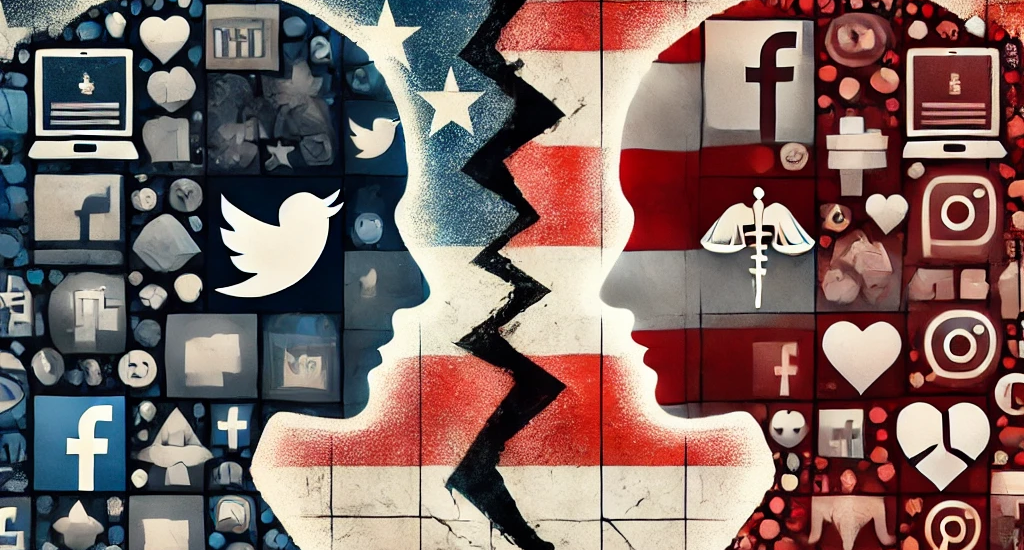In recent years, the political landscape in the United States has become increasingly polarized, driven by a cycle of misinformation and manipulation. Key issues such as women’s health and abortion rights, universal healthcare, immigration, and gender identity have been weaponized in a narrative designed to divide rather than unite. These topics are presented not as opportunities for meaningful dialogue but as battlegrounds for ideological warfare. The result is a nation teetering on the edge of irreconcilable division.
Misinformation surrounding these issues is not new. For decades, certain narratives have been recycled and amplified to stoke fear and mistrust. Consider the rhetoric around universal healthcare: proponents are often met with cries of “socialism” or “communism,” terms misused and distorted to paint an inaccurate picture of government control and oppression. Similarly, abortion and women’s health are framed in ways that vilify women’s autonomy, often under the guise of preserving traditional family values.
Immigration is another flashpoint, with exaggerated crime statistics used to create an image of lawlessness and danger. The demonization of immigrants not only ignores the reality of their contributions but also sows seeds of xenophobia and division. Meanwhile, debates on gender identity are framed as an existential threat to the “nuclear family,” with little regard for the lived experiences of individuals and the complexities of human identity.
At the heart of these narratives is a single, powerful lie: division is necessary. By fostering division, political operatives and media figures push the left further left and the right into more extreme territory, leaving little room for moderates or bipartisanship. This tactic creates a battlefield where compromise is seen as weakness and opposing viewpoints are treated as enemies rather than opportunities for understanding.
The lack of accountability within this framework is staggering. A glaring example is the continued influence of Donald Trump, despite his history of falsehoods, legal troubles, and ethical failings. The events of January 6th, 2021—a direct attack on democratic principles—serve as a potent reminder of the dangers of unchecked misinformation. Yet, there remains a concerted effort to downplay or erase this event from public consciousness, further eroding trust in institutions and accountability.
So, how do we move forward? How can truth and facts counter the pervasive tide of lies, misinformation, and hate? Education is a vital first step. Media literacy, for example, can equip people with the tools to critically evaluate information. Schools, community organizations, and media platforms must prioritize teaching individuals how to identify credible sources, verify facts, and recognize bias.
Accountability must also play a central role. Public officials who spread misinformation or engage in unethical behavior should face consequences. This requires robust legal frameworks, independent oversight bodies, and active civic participation to ensure that those in power are held to the highest standards.
Creating spaces for respectful dialogue is equally important. Division thrives in an environment of hostility and isolation. Initiatives that foster community engagement and mutual understanding can help bridge divides. Promoting civil discourse encourages a culture where differing viewpoints are seen as opportunities for growth rather than threats.
A free and independent press also has a critical role to play. Supporting journalism that prioritizes facts over sensationalism can help counter the spread of misinformation. Public media funding and protections for journalists are essential to ensure they can report the truth without fear of political or financial pressures.
Technology companies must also act responsibly. Social media platforms have become powerful amplifiers of misinformation, and their algorithms often prioritize engagement over accuracy. Reforming these systems and ensuring transparency in content moderation policies is a necessary step toward combating the spread of falsehoods.
Despite the divisions, there are shared values that unite most Americans: the desire for safety, opportunity, and dignity. Framing political discussions around these commonalities can shift the narrative from conflict to collaboration. The current state of US politics is not sustainable. The relentless cycle of misinformation and division undermines the democratic ideals that form the foundation of the nation. Breaking this cycle requires collective action, a commitment to truth, and a willingness to engage with those who hold different perspectives.
The path forward will not be easy, but it is necessary. By prioritizing accountability, education, and dialogue, we can begin to rebuild trust and create a political landscape that values unity over division. It’s time to reject the lies and work towards a future where truth and facts prevail.

